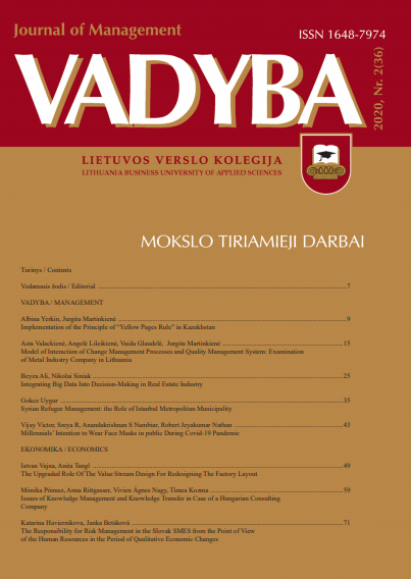THE RESPONSIBILITY FOR RISK MANAGEMENT IN THE SLOVAK
SMEs FROM THE POINT OF VIEW OF THE HUMAN RESOURCES IN THE PERIOD OF QUALITATIVE ECONOMIC CHANGES
THE RESPONSIBILITY FOR RISK MANAGEMENT IN THE SLOVAK
SMEs FROM THE POINT OF VIEW OF THE HUMAN RESOURCES IN THE PERIOD OF QUALITATIVE ECONOMIC CHANGES
Author(s): Katarina Haviernikova, Janka BetákováSubject(s): Business Economy / Management, Tourism
Published by: Lietuvos verslo kolegija
Keywords: technology based SMEs; tourism SMEs; responsibility; risk management; policy;
Summary/Abstract: Small and medium-sized enterprises (SMEs) in developed countries represent an important part of their economic environment. They belong to accelerators of economic development in regions and countries. One of the specifications of SMEs is that they allow people to learn to use their own entrepreneurial skills. Thus, the success of SMEs depends on the skills of the person who is responsible for business management in the enterprise.Without skilled and competent managers no activity will be performed effectively. The development and changes in the economic environment, in which SMEs operate, cause the various reversals connected with uncertainty and the resulting risks. A competent person (owner/manager) in SME will need to anticipate these risks and develop appropriate mitigation and strategies for them. The owner/manager of SME should consider the fact,that there could be deviations in the realization process against the planned goal. This deviation presents the risk and the representative of SME should know, how it is possible to manage this risk. It means to reduce its negative impact. The lack of knowledge is a fundamental problem in the failure of most initiatives in the SMEs and the lack of experience can become a major risk to business survival. The goal of owners/managers in SMEs should be to reduce the possible errors and risks in that way that the SME gets into a situation in which it can anticipate changes, and it is able to respond to them and exploit them to their advantage. Each SME is unique and the risk may occur differently in comparison with other SMEs. Risk management and mitigation of risk are important to ensure the security of the company and its continuous development. The risk management in SMEs is perceived as a means of the improvement of SMEs’ success in their activities, due to the fact, that in most cases the unpredictable situations represent a serious loss-making exposure for the SMEs business sector which leads to the loss. For those SMEs whose capital base is insufficient,they can have catastrophic consequences in the case of realized activities, and they can lead to financial losses and subsequently to possible bankruptcy. For this reason, risk management is a prerequisite for minimization of the negative effects of unexpected situations. Still, a lot of SMEs rarely carry out process-related activities risk management. It is affected by limited resources (financial, human), which SMEs have, and which process risk management. There is a wide range of studies focused on risk management in SMEs, but only several of them are focused currently on the responsibility for risk management. This paper contributes to the dissemination of knowledge about the responsibility for risk management in SMEs and provides wider analysis in ways of responsibility for it. To reach the main of the paper, questionnaire surveys among 1018 Slovak SMEs were conducted. We compared the responsibility for risk management in SMEs between two groups of SMEs – technological and tourism from the point of view of sized category, and regional of SMEs. For the evaluation of differences and dependencies among three groups of respondents’ answers, according to their size category, economic branch in which they operate, and regional location, the Chi-square test was used. The associations among respondents’ answers were evaluated through Cramer’s V. The results showed the differences in responsibility for risk management among Slovak SMEs. The results of this study may provide implications for subsequent research focused on responsibility for riskmanagement in the wider context
Journal: VADYBA
- Issue Year: 36/2020
- Issue No: 2
- Page Range: 71-77
- Page Count: 7
- Language: English

